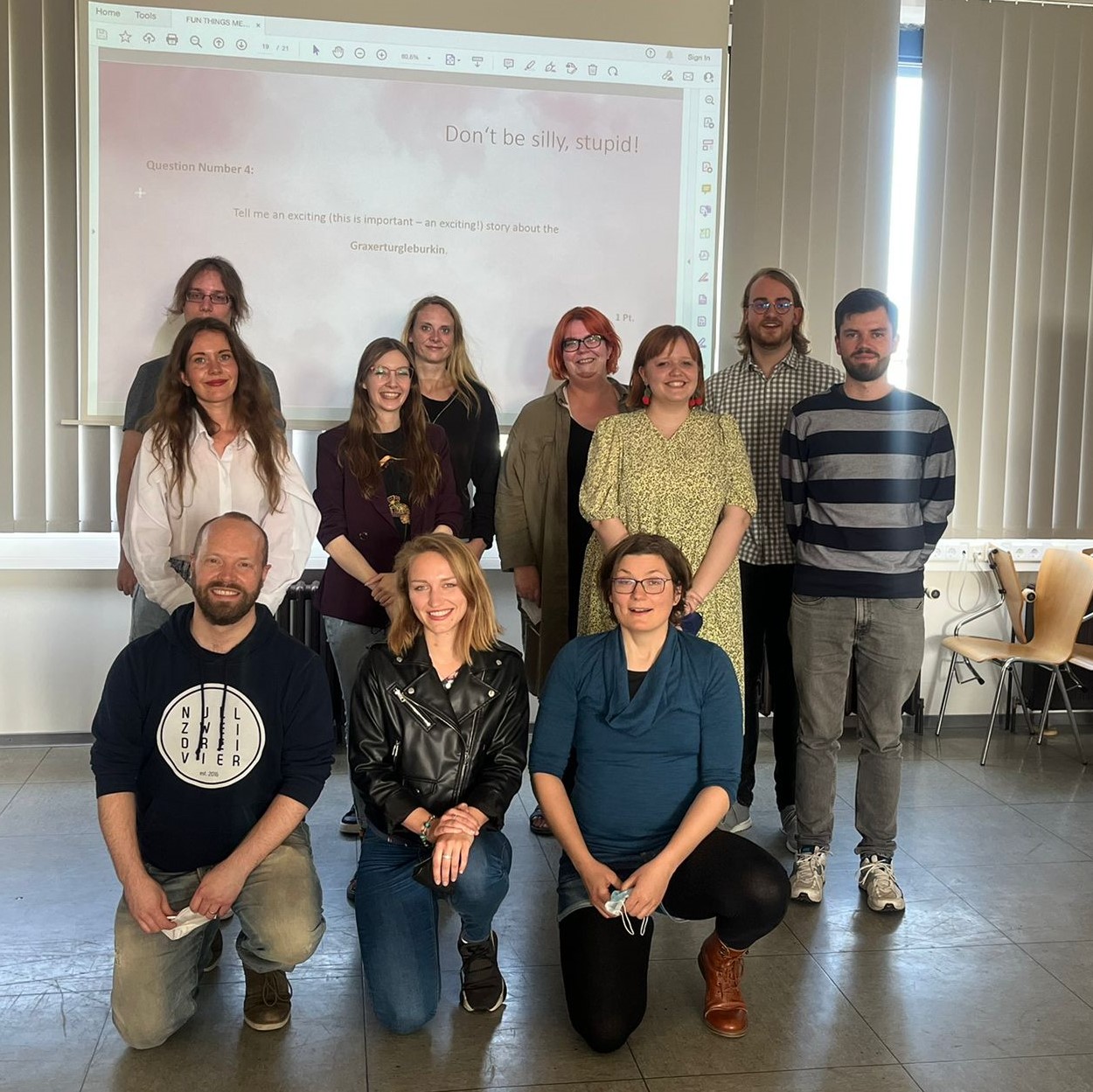#MEDIEVAL: The Students’ Colloquium in its Final Form
by Moritz Draschner
I think it is no exaggeration if I say: Anglistik 1’s very first students’ conference was a glaring success! When Anne Röseler first asked me if I wanted to present a paper at what would be my first-ever conference experience, I was terrified and intrigued at the same time: talking at a public event about a piece of my very own research seemed daunting in the beginning, but thinking back at how openly and warmly the long-running students’ colloquium had always welcomed any and all ideas, I soon realised that this would be the perfect opportunity to get a taste of what conferences are like.
What made this experience so special were all the amazing presentations by students with all different kinds of interests: Sam Saur compared J. R. R. Tolkien’s and Maria Dahvana Headley’s translations of Beowulf and showed us how the language of various points in time can shape our understanding of ancient tales. Adrian Rauth pushed us out of our comfort zones and into the medievalist sphere by talking to us about gender norms and performativity in Terry Pratchett’s Monstrous Regiment, before Eileen Foy pulled us back to the medieval timeline and enlightened us by talking about love and desire in Chaucer’s dream visions. Celina Tillack then skilfully made the implied explicit by connecting Margery Kempe’s sexual needs with her undying devotion to Christ, rounding us off with a lesson on religious authority and the complex issue of virgin motherhood. Speaking of religious authority, I myself presented my Bachelor’s thesis on the racialisation and discrimination of non-Christian (i.e., mostly Jewish) characters in an Old English apocryphal text, which probably made everyone feel bad but then hopefully curious!
After this intense block of absorbing knowledge and broadening our horizons, we were then treated with an abundant buffet of snacks and drinks sponsored by Prof Dr Miriam Edlich-Muth and participants, as well as with some story-time: Jannis Jakobs told us about his 77-day journey to the University of Oxford and how he got to see and touch the Ormulum in person! He had the chance to visit all the different colleges and libraries of Oxford as part of his ongoing research and made us all want to apply for a semester abroad. In fact, if you want to know more about this, keep your eyes peeled for an upcoming blog post by Jannis! Eileen followed the trend by showing us pictures of her time at Aberystwyth University and making us want to learn Welsh and Irish—at the same time! Jill Bomanns finally put the cherry on top with a lovely video message from her travels through the cities and nature of beautiful Scotland, instilling a wanderlust in me that I have yet to satisfy! Jill deserves this time off more than any of us, though, because she completed her Master’s thesis a couple of months ago—warmest congratulations from all of us again!!
All this was followed by the last and most creatively demanding chunks of the day: a group of readers, including Dr Simon Thomson, Dr Niamh Kehoe, Sam, Jannis, Anne, Adrian, and myself, performed parts of Beowulf in Old English and in translation, evoking an atmosphere fitter for a campfire at midnight rather than a conference at uni! Eileen finished this section off with a beautifully written poem envisioning what the introduction to Chaucer’s The Legend of Good Women might have looked like had John Keats written it in the early 19th century—but with her own 21st-century twist. Our wits were finally put to the test in a round of amazingly tricky but fascinating pub quizzes hosted by Elena Lysova, Sam and Anne. For me, the most “fun” part of this was conceived by Jannis, who made me never want to look at Anglicana script (@Carina: https://chaucer.fas.harvard.edu/types-script) or think about historical dates ever again!
So that was it, the first #MEDIEVAL students’ conference at HHU—a wonderful opportunity for early researchers to make their first attempt at presenting something in front of an audience, a familiar space in which lovers of all things medieval can meet up to geek out, and an all in all delightful way of getting together and seeing what everyone has been up to. Here’s to the next instalment, which hopefully isn’t too far off!
References:
Images: All photos taken by Elena Lysova.
For more information about the Ormulum check out the Digital Bodleian.



